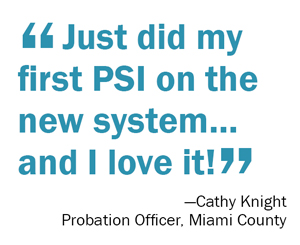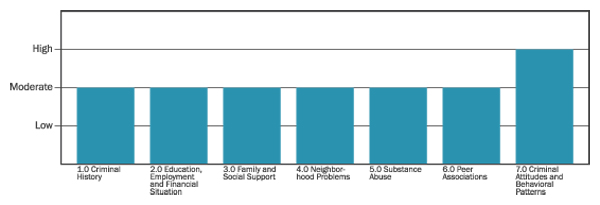The Judicial Conference of Indiana is a statutorily created body consisting of all of the trial, appellate, and senior judges serving in Indiana. A board of directors guides their activities, which are carried out by the Indiana Judicial Center. In Indiana, probation services are housed within the judiciary, and probation officers work for and at the direction of the judges who employ and supervise them. The Indiana Legislature directed the board of directors of the judicial conference to prescribe minimum standards for the Presentence Investigation (PSI) report that probation officers prepare and Indiana judges use when imposing sentences. The purpose of the PSI report is to compile an offender’s social and legal history. The trial judge uses the PSI as a tool in determining sentencing options.
 During 2011, the Indiana Judicial Center and the Judicial Conference Probation Officer Advisory Committee revised the existing PSI report to incorporate additional information (see chart) including information from the Indiana Risk Assessment System (IRAS) for adults. (See prior articles on risk assessment in March/April 2011 and September/October 2011 issues of Indiana Court Times.) These risk assessment tools are used at key stages in the criminal justice process to assess the offender’s risk to reoffend and to determine the level of supervision and resources appropriate for addressing the particular risks. The risk assessment tools were automated in 2011 enabling courts and law enforcement unprecedented ways to share information. They are part of the Indiana Supreme Court’s secure website known as INcite (Indiana Court Information Technology Extranet) which thousands of people use to collect and exchange information with each other and with others who need and use court information.
During 2011, the Indiana Judicial Center and the Judicial Conference Probation Officer Advisory Committee revised the existing PSI report to incorporate additional information (see chart) including information from the Indiana Risk Assessment System (IRAS) for adults. (See prior articles on risk assessment in March/April 2011 and September/October 2011 issues of Indiana Court Times.) These risk assessment tools are used at key stages in the criminal justice process to assess the offender’s risk to reoffend and to determine the level of supervision and resources appropriate for addressing the particular risks. The risk assessment tools were automated in 2011 enabling courts and law enforcement unprecedented ways to share information. They are part of the Indiana Supreme Court’s secure website known as INcite (Indiana Court Information Technology Extranet) which thousands of people use to collect and exchange information with each other and with others who need and use court information.
On November 7, 2011, the Judicial Technology and Automation Committee (JTAC) staff of the Division of State Court Administration deployed the PSI application during a pilot phase to five Indiana probation departments in the following counties: Marion, Tippecanoe, Monroe, Dearborn, and Blackford. On January 3, 2012, the PSI application was launched statewide to over 930 probation officials. By the end of February, 2012 probation officers had completed 2,300 PSI reports in INcite. The Judicial Conference Board of Directors requires that all probation departments utilize the new INcite PSI application.

Probation officers across the state can view completed PSI reports and, when dealing with repeat offenders, officers have the ability to create a new PSI report using information stored within INcite from previous reports. The ability to collect, store and share information that is needed repeatedly becomes invaluable when compiling the legal history of an offender. Prior to the automated PSI application, probation officers were completing PSI reports independently and not sharing completed reports with other departments throughout the state.
After using the PSI application for the first time, Cathy Knight, a Probation Officer with the Miami County Probation Department, declared “Just did my first PSI on the new system…and I love it!”
In January 2012, a group of stakeholders joined efforts with the Division’s JTAC staff and began work on the next phase of this project—a standard, electronic version of the Abstract of Judgment. Information from the PSI report will be pulled into the Abstract of Judgment, creating a legible document, avoiding duplicate data entry, and ensuring the accuracy of the information. The trial court will be able to attach the Judgment of Conviction and the Sentencing Order to the Abstract. By statute, the PSI report, the Abstract of Judgment and the Sentencing Order must be submitted to the Indiana Department of Correction (DOC) whenever a convicted person is sentenced to a DOC facility. Using INcite, DOC staff will be able to retrieve the PSI report, Abstract and Sentencing Order directly from the INcite Application. This will result in cost savings, more efficient communication between courts and DOC, and fewer resources expended to track down missing paperwork. And, when the Abstract of Judgment application is used by all courts on a statewide basis, comprehensive conviction and sentencing information will be readily available to prosecutors, judges, legislators, policy makers and the general public.
On March 19, 2012, House Enrolled Act 1200 was signed into law by Governor Mitch Daniels. This law adds section 31 to Indiana Code 35-38-1 and states in part that “if a court imposes on a person convicted of a felony a sentence that involves a commitment to the department of correction, the court shall complete an abstract of judgment in an electronic format approved by the department of correction and the division of state court administration.” Using JTAC’s INcite Abstract of Judgment application, courts will be able to comply with the new law. JTAC will make this application available on or before July 1, 2012, the effective date of the new electronic reporting provisions.